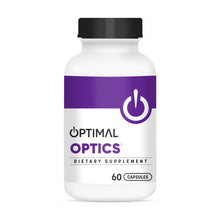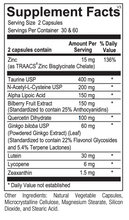- Description
- Benefits
- Supplement Facts
Clinical Applications
- Provides Key Antioxidant Support for Eyes
- Supports Macular Health
- Increases Ocular Circulation
In the US, eye health is a major concern for those over 60 years of age. The eye is the most susceptible organ to oxidative damage caused by light, toxins (smoke), atmospheric oxygen and abrasion. As ultraviolet and blue light pass through the retina to the photoreceptors (rods and cones) and the pigmented epithelial (PE) cells, reactive oxygen species (free radicals) are generated. If there are insufficient antioxidants available to neutralize free radicals, the eye undergoes excessive oxidative damage.
Optics was formulated with a specific blend of botanicals, nutrients, antioxidants and minerals, shown in research to support healthy eye function. The formula provides potent antioxidant support as well as key nutrients to care for and maintain the long-term health of the eyes.
Suggested Use:
2 capsules per day or as recommended by your health care professional.
Alpha Lipoic Acid
Alpha lipoic acid (ALA) is a potent, versatile antioxidant that is both water- and fat-soluble. ALA has been shown to inhibit aldose reductase, which prevents sorbitol-induced leakage of important antioxidants from eye tissues and recharges ALA, vitamin C, E and glutathione. Used clinically in Russia, animal studies have shown ALA has the potential to reach high concentrations in and be protective to the ocular lens of rats. Recent studies have shown lipoic acid increases insulin-stimulated glucose disposal both in whole body and in skeletal muscle, thus helping to promote healthy blood sugar levels.
Ginkgo Biloba
Ginkgo biloba extract is a well-studied botanical that increases cerebral blood flow and protects neurons from a variety of conditions and oxidant-induced damage. It scavenges NOS (Nitric Oxide Species) and ROS (Reactive Oxygen Species), supports mitochondrial function, inhibits NMDA receptor activation, antagonizes PAF (Platelet Activating Factor), and stimulates the release of NO to support cerebral blood flow. It has been shown to provide key antioxidant support for eyes.
Carotenoids: Lutein, Zeaxanthin, Lycopene
Lutein and zeaxanthin are carotenoid pigments whose role in eye health is well-established from epidemiological, clinical and interventional studies. Epidemiologic research shows a connection between high levels of lutein and zeaxanthin in eye tissues and enhanced eye function and visual acuity. Lutein and zeaxanthin supplementation has been shown to protect the lens protein, lipid and DNA from oxidative damage and improves intracellular redox status under oxidative stress. Increased dietary intake of carotenoids, especially lutein and zeaxanthin, protect the eye from oxidative stress.
Zinc
A vital coenzyme for eye tissue, zinc is a necessary component in antioxidant enzymes including superoxide dismutase, glutathione peroxidase and catalase. The enzymes responsible for digesting rod outer segments and preventing the build-up of lipofuscin, a lipid-containing residue caused by normal “wear and tear” that can impair vision, are significantly less active in older individuals. These important enzymes can be stimulated by adding zinc.
Bilberry
Bilberry extract contains a high amount of the antioxidants known as anthocyanadins, similar to those found in grape seeds. Bilberry has a long history of use in eye health. Its activities include inhibition of aldose reductase, and improving capillary permeability. Bilberry has been shown to protect against an oxidative stress-induced immune response in the mouse uvea and to support night vision. The extract has also been found to support renewal and homeostasis of corneal cells.
Quercetin
A flavonoid found in a variety of herbs, vegetables and fruits, quercetin provides key antioxidant support for eyes.
Taurine
Taurine concentration is high in the retina and is required for retinal tissue growth. It has been shown to protect rod outer segments from oxidative damage and to protect lens tissue from radiation. Researchers have suggested possible functions for taurine in the retina include protection of the photoreceptor, regulation of Ca2+ transport, and regulation of signal transduction.

Sign up for weekly offers, news and advice
Plus 15% off your first order







